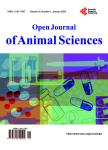Short communication: Supplementing with vitamin E may alter the fibrinolytic capacity of cattle
Short communication: Supplementing with vitamin E may alter the fibrinolytic capacity of cattle作者机构:Department of Animal Sciences Oregon State University Corvallis USA Department of Animal Sciences Oregon State University Corvallis USA
出 版 物:《Open Journal of Animal Sciences》 (动物科学期刊(英文))
年 卷 期:2013年第3卷第2期
页 面:114-120页
学科分类:1002[医学-临床医学] 100214[医学-肿瘤学] 10[医学]
主 题:Bovine Cystic Ovarian Disease Retained Placenta Fibrinolysis
摘 要:Vitamin E supplementation has been reported to decrease the incidence of cystic ovarian disease (COD) and retained placenta (RP) in cattle however the mechanism of action is not known. In humans, vitamin E supplementation twofold the daily requirements decreases plasma plasminogen activator inhibitor-1 (PAI-1) activity. As proteolysis may be involved in both COD and RP, vitamin E may be reducing these disorders in cattle through its effects on PAI-1. To evaluate the effects of vitamin E on plasma PAI-1 activity in cattle, six non-lactating beef cows (n = 3 per treatment) were injected with 0 (Control) or 2750 IU of vitamin E (Vitamin E) IM once every four days for 24 days (Day 0 = first day of treatment). Blood samples were collected every two days for 28 days starting on Day 0 and plasma PAI-1 and tissue-type plasminogen activator (tPA) concentrations and activities were determined. No differences (P 0.05) were observed due to vitamin E supplementation in plasma PAI-1 and tPA concentrations and activities or concentrations and activities adjusted relative to the Day 0 value for each cow. Day of treatment was a significant effect in all tPA measurements. The ratio of adjusted PAI-1 to tPA concentrations did not differ (P 0.05) due to vitamin E supplementation however the ratio of PAI-1 to tPA activity tended to be greater (P = 0.097) in Control compared to Vitamin E cows (1.0 ± 0.1 and 0.7 ± 0.1, respectively). These data suggest vitamin E supplementation may contribute to the reduced incidence of COD and RP in cattle by shifting the ratio of plasma PAI-1 to tPA activity to a state favoring proteolysis.



